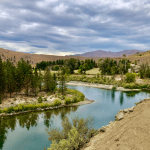
The Methow River is an essential source of life in this Valley
In its 80-mile flow from the crest of the North Cascades to the Columbia it replenishes the aquifers we depend on, keeps our fish and wildlife alive and thriving, grows our local crops, sustains our local economy and creates resiliency in the face of climate change.

This River cannot be taken for granted
The Methow River and its tributaries flow through a dry, shrub-steppe landscape that only receives 15″ of precipitation each year. The river is dependent on mountain snowpack to carry it through the dry months. Climate change introduces uncertainty to when, where and how we receive this precipitation as summers become hotter and drier and winters bring less snowpack. To prepare for uncertainty in the future, we must protect and allocate our water wisely today.

The time to act on our river is now
We know that climate change will bring droughts with it. We know that development pressures will continue and the Methow’s water will become ever more valuable to out of basin speculation. MVCC and partners are working proactively to make sure we have enough water to support what our community values so when disruption arrives we are prepared.
MVCC’s Work on Water
Comprehensive Plan: MVCC continues to press Okanogan County to adequately prepare for an increasingly unpredictable water supply in their Comprehensive Plan. The Comprehensive Plan sets the blueprint for growth and development in the County. MVCC believes the Comprehensive Plan should direct growth towards areas that have legal and physical water available so that land use is consistent with available water.
Water Banking: To keep our water within our watershed, MVCC advocated for the creation of a locally managed, public water bank. In 2021, Washington earmarked $2 million over the next two years for the Methow Valley to establish a water bank. Through a water bank, existing water rights can be acquired from current users who are no longer using their water. The water rights are transferred to the bank and can be used for instream flow, irrigation, and mitigation depending on what type of water right they are (instream, agricultural, municipal etc.). The creation of this water bank could help create an equitable exchange and keep water instream for fish and wildlife.
Thoughtful Affordable Development: MVCC supports more affordable housing throughout the Valley, especially within towns where water rights and infrastructure supports this growth. We are an integral part of the Housing Solutions Network which is working to actively identify and address the most pressing housing needs in the Methow Valley. Learn more at www.methowhousingsolutions.org
Enloe Dam: MVCC continues to support and elevate efforts to remove Enloe Dam. The dam, which has not produced power for the last 63 years, presents an insurmountable obstacle to fish passage into 340 miles of cold-water habitat on the upper Similkameen River. Removing it would help to restore chinook salmon and steelhead runs to the Similkameen River, a major tributary of the Okanogan River above Oroville. Recently, the owner of the dam, the Okanogan County Public Utility District (PUD), has thrown its support behind an effort to obtain $2.2 million for a feasibility study on the removal of the dam. MVCC is committed to connecting people across the county to ensure that everyone understands the issues and importance of restoring the Similkameen River. Check out the work our partners Restore Similkameen and Aboriginal Outfitters are doing on this issue.
Highlighted Work by Local Organizations
Aboriginal Outfitters: This indigenous-led non-profit on the Colville Reservation is working to to shine a light on the cultural significance of removing the Enloe Dam and
Restore Similkameen: Restore Similkameen is a community-led effort seeking to bring awareness about the necessity of removing Enloe Dam and restoring the Similkameen River for the benefit of fish, wildlife, public, and local economy
Resilient Methow: Resilient Methow is working to implement the Methow Valley Climate Action Plan. A key strategy in this Plan is preparing for changing water availability.
Methow Watershed Council: The Methow Watershed Council actively assists in managing water supplies for a sustainable balance between human and ecological needs. The Council endorses the development of voluntary strategies for optimizing water use and provides ongoing community outreach and education on valley-specific water issues.
